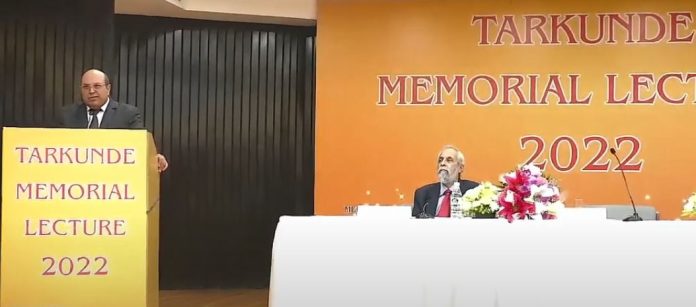Former Supreme Court judge Justice Rohinton Fali Nariman has suggested that in hate speech cases, civil courts should take up matters for awarding punitive damages, instead of issuing injunctions and declarations against culprits.
Justice Nariman made the suggestion during the 13th VM Tarkunde Memorial Lecture on “Rights, Duties, Directive Principles: What is Fundamental?” on Saturday, noting that it is quite well known that criminal law is put into motion selectively.
Talking about the remedy for hate speech, Nariman said that civil courts should take up a suit filed by any citizen against hate speech as it disrupts harmony by awarding them punitive damages.
Nariman underlined the point saying, “Nothing hurts more, than when it hurts the pocket.” He added that if courts start taking cognisance of civil suits regarding hate speech in this manner, fraternity and brotherhood shall be maintained.
The retired judge said the Supreme Court has recently given an order saying every authority must act the very instance a hate speech begins.
The former judge also referred to the directive issued on October 21, instructing police and other authorities to immediately register suo motu cases against hate speech makers without waiting for a complaint to be filed.
Issuing a set of interim directions in a plea to curb hate speech, the Apex Court bench of Justice K.M. Joseph and Justice Aniruddha Bose, said that it is a plight that we have reduced religion to such a low level in the 21st century.
The event was organised by the Tarkunde Memorial Foundation in memory of Justice VM Tarkunde, the founder of the civil liberties movement in India, who was a judge of the Bombay High Court, apart from being a prominent lawyer.
Speaking of the fundamental duties of citizens, Nariman noted that the fifth fundamental duty of fraternity is of crucial importance.
The fifth fundamental duty states to promote harmony and the spirit of common brotherhood among all the people of India transcending religious, linguistic, and regional or sectional diversities; to renounce practices derogatory to the dignity of women.
Nariman said now when it is about the nation, its composite culture should take centrestage.
He spoke of the civil court route to tackle hate speech while saying that if we are actually going to live by the cardinal principle of fraternity, which is the only constitutional method of assuring the dignity of the individual and the unity and integrity of individuals, then it must be given some teeth.
The former SC judge said the citizens of the country should know the Constitution, their rights, duties and for that, the government of the day should distribute the Constitution in every possible language.
Retired Supreme Court Justice Madan B Lokur, the president of the Tarkunde Memorial Foundation, also spoke at the memorial event. Echoing Justice Nariman’s view, Justice Lokur emphasised that brotherhood and harmony are vital in diverse democracies but added that judicial independence and integrity are equally important.
The daughter of late Justice VM Tarkunde, Advocate Manik Karanjawala delivered the vote of thanks in which she paid tributes to doyens of the Bar, Soli Sorabjee and Ashok Desai, the former President and Vice President of the Foundation, who passed away last year.


